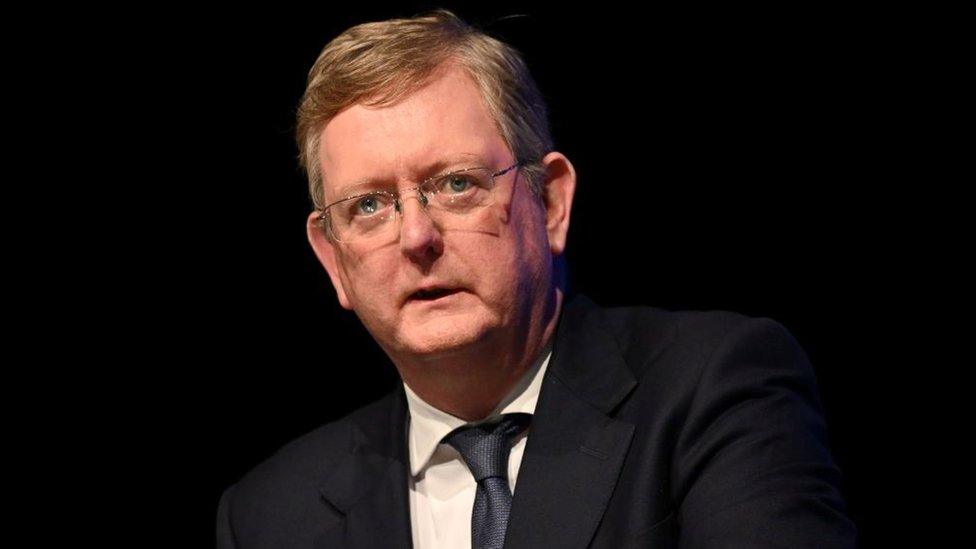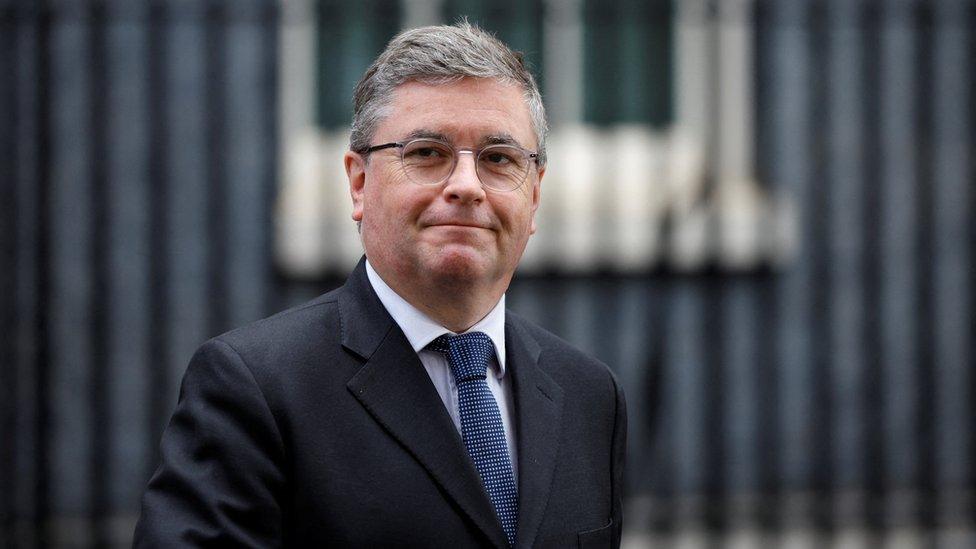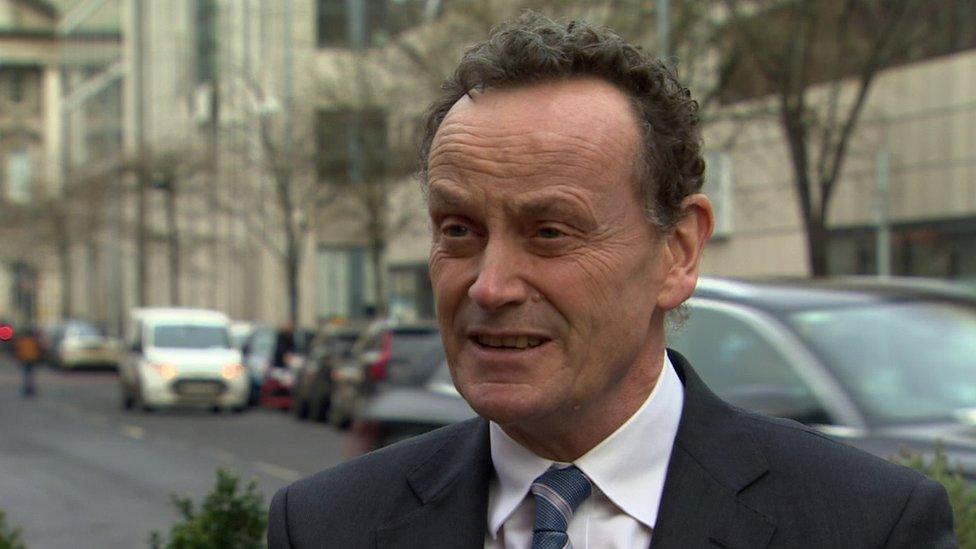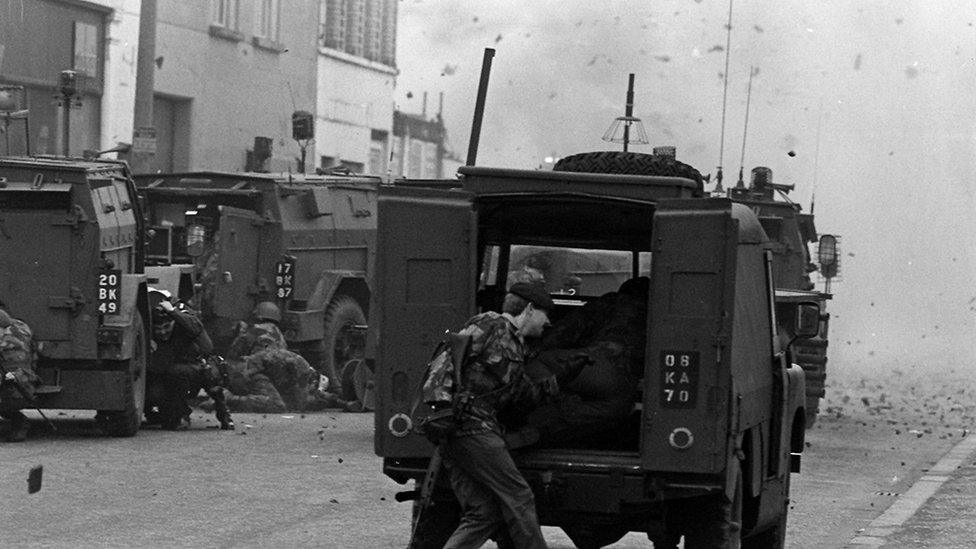Troubles legacy act: UK-Irish relations consequences 'not ruled out'
- Published

Lord Caine said the UK legacy bill was compatible with international obligations
Consequences for UK-Irish relations cannot be ruled out over legal action on the Troubles legacy act, a Northern Ireland Office (NIO) minister has said.
On Wednesday, the Irish government said it would challenge a UK law which offers a conditional amnesty for Troubles-era killings.
Lord Caine said the legislation was "compatible" with the UK's international obligations.
He added the Irish government's action was "profoundly" regrettable.
The UK act, which became law in September, has been widely opposed by victims groups and political parties in Northern Ireland.
On Thursday, Taoiseach (Irish prime minister) Leo Varadkar said his government's decision was taken after "a lot of consultation" and "to honour the promise that we made to the victims' families and to the survivors".
He added there was strong legal advice from Ireland's attorney general.
Earlier, Lord Caine said the law was the "only show in town" and the UK would try to "minimise any consequences arising out of this".
Speaking to Radio Ulster's Good Morning Ulster, he said: "We deeply regret the fact that the Irish have decided unilaterally to take this case in the Strasbourg court.
"Of course we highly value the relationship with the Irish government - it's a hugely important bilateral relationship for us.
"Can I rule out any consequences? The answer is no."
Lord Caine said the government had taken in many of the concerns that have been expressed with the result being a "robust piece of legislation which is able to provide answers in a more timely matter".
'Murder is murder'
Fergus O'Dowd, a Fine Gael member of the Dáil (Irish Parliament), said the legal challenge by the Irish government was the last resort after "all other political options" had been explored.
Mr O'Dowd, who is the chairperson of the Dáil's Joint Committee on the Implementation of the Good Friday Agreement, said it was unusual that all parties in the Republic of Ireland agreed on the step.
He said there were concerns about Ireland relationship with Britain and Northern Ireland but his government felt the human rights of victims and families could not be ignored.
"Are they not entitled to all those rights, are they not entitled to know the truth? No matter when it happened, murder is murder whether it was yesterday, today or 20 years ago," he said.
"At the heart of the Good Friday Agreement is reconciliation, you cannot reconcile the murder of your loved with a system that does not allow due process to get to the truth of the matter."

Sir Robert Buckland says the legal action should not prevent discussions continuing between the two governments
Speaking about the legal challenge, the chair of Westminster's Northern Ireland Affairs Committee, Sir Robert Buckland, said it was a "very grave situation and I am deeply concerned about the breakdown here".
The former justice secretary said the legal action should not prevent discussions continuing between the two governments.
He told BBC Radio Ulster's Nolan Show that as a government minister, he was involved in the early development stages of the Troubles legacy legislation.
"I accept there is unilateralism here on the part of the UK government, but put yourself in the position of a legislator, a government, trying to get some more effective way of allowing people to get to the bottom of what happened," he said.

Victims' Commissioner Ian Jeffers welcomed the action of the Irish government
Victims' Commissioner Ian Jeffers said he was not surprised by the action launched by the Irish government but he was taken aback by the timing.
He said he was pleased that it was the government rather than victims who would have to be going to court at Strasbourg.
Mr Jeffers said that victims and families had not been appropriately consulted on the legacy bill.
"This was foisted upon us by one particular political party and there hasn't been a consensus from anybody north or south," he said.
Speaking after Lord Caine's comment on relations between Ireland and Britain, Mr Jeffers said: "There is no point in making idle threats with victims and survivors in the middle of this."
'Constantly ignored'
Speaking to BBC's The North West Today, SDLP leader Colum Eastwood welcomed the Irish government's decision.
He told the programme this move did not come as a surprise and believes "it was the only option left" for Dublin and Troubles victims' families.
Mr Eastwood added the only ones to blame for any potential break down in Anglo-Irish relations is the UK government, who he said "have constantly ignored the vast majority of people of Northern Ireland and the Irish government".
"This is their own making, they have done this themselves and I think they will lose this case."

More than 3,500 people were killed during the Troubles, with thousands more injured
An ICRIR (Independent Commission for Reconciliation and Information Recovery) spokesperson said: "The commission has committed to following the European Convention on Human Rights and it is important that clarity in the legislation is provided by the courts.
"In any process it is important that prompt, independent and thorough investigations are carried out for families, victims and survivors and that is what the commission is seeking to deliver."
The ICRIR was set up in an attempt to help families find out more about the circumstances of how their loved ones were killed or seriously injured.
Self-confessed perpetrators who provide a truthful account of their actions to the ICRIR can be granted immunity from prosecution.
'Honourable approach'
In 2021, former prime minister Boris Johnson said the bill was designed to "draw a line under the Troubles", a 30-year conflict that cost more than 3,500 lives.
The act sets up an independent commission, which aims to help families find out more about the circumstances of what happened to their loved ones.
This could lead to self-confessed perpetrators being granted immunity from prosecution.
It also puts a stop to new court cases and inquests from the Troubles being held.
Northern Ireland Secretary Chris Heaton-Harris said the Irish government legal challenge was "disappointing" but one that the UK had prepared for.
Addressing his Irish counterparts, he added it was "inconsistent and hard to reconcile with its own record" on dealing with legacy matters.
On Wednesday, Ireland's move was welcomed by Sinn Féin, while the Democratic Unionist Party (DUP) leader Sir Jeffrey Donaldson said the Irish government had no proposals to deal with legacy issues related to its own jurisdiction.